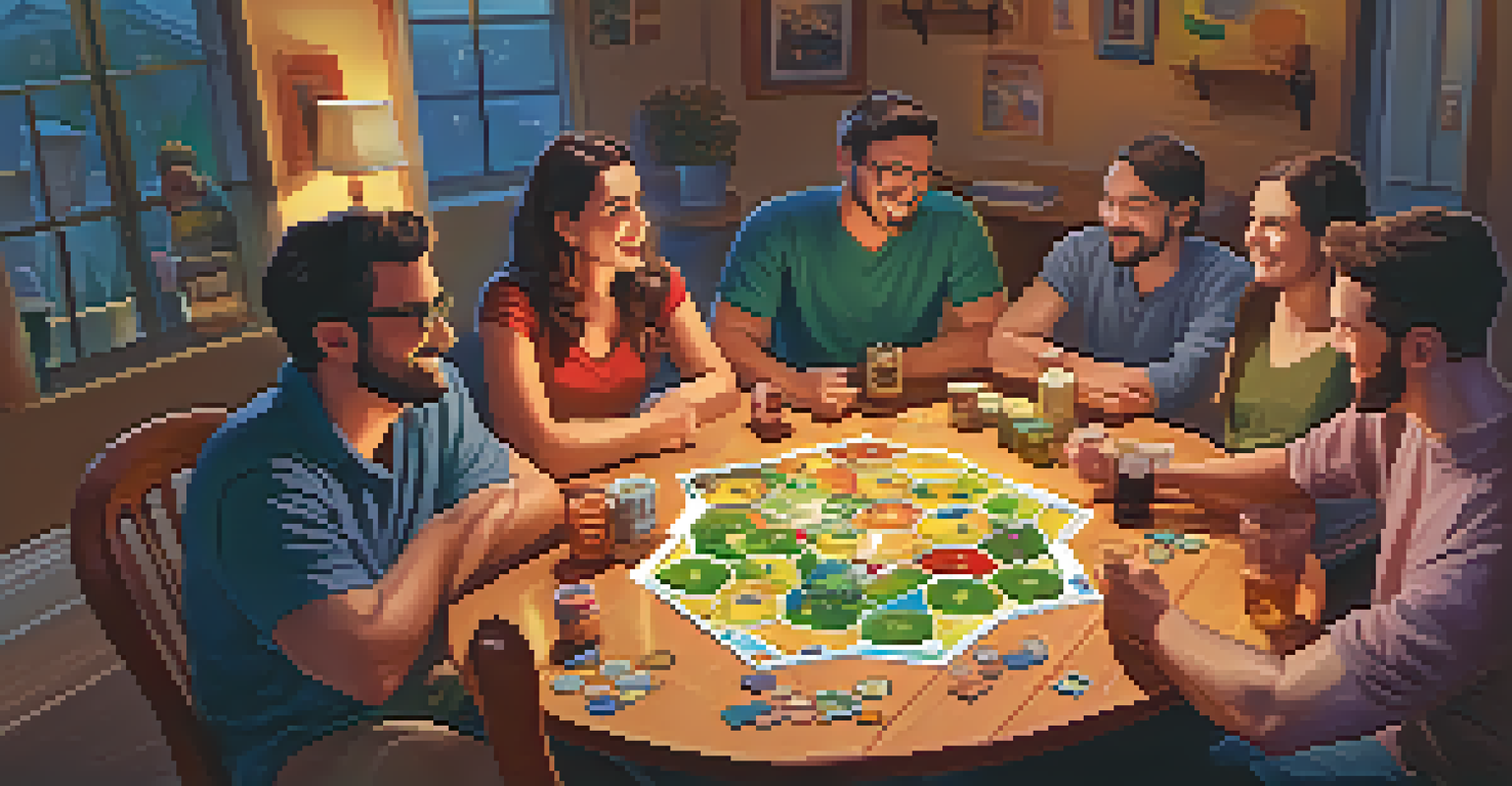The Evolution of Tabletop Games: From Classic to Modern

The Origins of Tabletop Games: A Historical Perspective
Tabletop games have roots that stretch back thousands of years, with ancient civilizations enjoying early forms of play. Games like Senet in Egypt and Go in China not only entertained but also served as strategic battle simulations. These early tabletop games laid the groundwork for the social interactions and competitive spirit that define the genre today.
Games are a part of every culture, and the way we play reveals how we relate to one another and ourselves.
As cultures evolved, so did their games. The Middle Ages saw the rise of chess, a game that emphasized strategy and foresight, becoming a staple in European households. This period marked a significant shift as games began to reflect societal values and complex narratives, paving the way for future developments in the genre.
The historical significance of these early games cannot be overstated. They were not merely pastimes; they were a reflection of the societies that created them. Understanding their origins helps us appreciate how far tabletop gaming has come and the diverse influences that shaped its evolution.
The Golden Age: Classic Board Games That Shaped the Industry
The mid-20th century is often referred to as the Golden Age of Board Games, where classics like Monopoly and Scrabble became household names. These games introduced families to the joys of playing together and set the stage for the modern gaming industry. Their simple yet engaging mechanics made them accessible to players of all ages.

During this time, the concept of game night emerged, fostering social interactions and family bonding. The success of these classic games demonstrated the commercial viability of tabletop gaming, leading to an explosion of new titles and variations. Companies began to invest in game design, focusing on enhancing player experience and creativity.
Tabletop Games Evolve Over Time
From ancient games like Senet to modern RPGs, tabletop gaming has continually transformed, reflecting societal changes and fostering creativity.
This era's impact is still felt today, as many contemporary games draw inspiration from these timeless classics. Understanding the significance of this period helps us appreciate how these games not only entertained but also shaped social dynamics and community engagement.
The Rise of Role-Playing Games (RPGs) in the 1970s
The 1970s marked a significant turning point in tabletop gaming with the introduction of role-playing games, most notably Dungeons & Dragons. This innovative format allowed players to step into the shoes of characters, fostering creativity and collaborative storytelling. RPGs opened the door to a whole new way of gaming, emphasizing imagination and narrative over mere competition.
The best games are those that inspire not just competition, but collaboration and creativity among players.
Players became immersed in fantastical worlds, navigating challenges and adventures crafted by a Dungeon Master. This shift from traditional board games to RPGs challenged the norms of gameplay, encouraging deeper engagement and social interaction. The rise of RPGs also spurred a community of enthusiasts who shared a passion for storytelling and character development.
The influence of RPGs can still be seen in many modern tabletop games, which incorporate storytelling elements and character-driven mechanics. This evolution illustrates how gaming can serve as a powerful medium for creativity and collaboration, turning players into co-authors of their adventures.
The 1990s and the Birth of Modern Board Gaming
The 1990s ushered in a renaissance for board gaming, thanks to innovative designers like Klaus Teuber, who created Catan. This era saw the emergence of Eurogames, which focused on strategy and resource management rather than luck. The appeal of these games lay in their ability to create engaging experiences that emphasized tactical decision-making.
Modern board games began to diverge from their classic predecessors by incorporating complex mechanics and diverse themes. Players were no longer just rolling dice; they were negotiating, trading, and planning their way to victory. This shift attracted a new generation of gamers eager for more depth and complexity in their gameplay.
Diverse Trends Shaping the Future
Current trends such as hybrid games, inclusivity, and sustainability are driving innovation and community engagement in the tabletop gaming industry.
The 90s marked a resurgence of interest in tabletop gaming, leading to conventions and clubs dedicated to the hobby. This renewed enthusiasm helped establish a vibrant community that continues to thrive today, making board gaming a significant cultural phenomenon.
The Digital Age: Technology's Impact on Tabletop Games
As technology advanced, so too did the landscape of tabletop gaming. The rise of the internet and digital platforms allowed for online play and virtual tabletop experiences, expanding the reach of board games beyond physical gatherings. This shift enabled players from around the world to connect and enjoy games together, fostering a global gaming community.
Digital adaptations of classic board games and the creation of entirely new digital-only games have become popular. These innovations have made games more accessible, allowing players to enjoy their favorite titles without the need for physical components. However, the essence of tabletop games—social interaction and shared experiences—remains central, even in digital formats.
The integration of technology in tabletop gaming reflects a broader trend in entertainment, where the lines between physical and digital experiences blur. Understanding this evolution helps us appreciate how technology has both challenged and enhanced the way we play, offering new opportunities for creativity and connection.
The Contemporary Scene: Diversity and Innovation in Gaming
Today, the tabletop gaming scene is more diverse than ever, with designers from various backgrounds creating unique games that reflect different cultures and perspectives. This surge in creativity has led to innovative gameplay mechanics and themes, making the industry vibrant and exciting. Games that explore social issues or incorporate cooperative play are becoming increasingly popular, resonating with a broader audience.
Conventions like Gen Con and Essen Spiel showcase this diversity, inviting players to discover new titles and meet the creators behind them. The community aspect of tabletop gaming has grown, with online platforms allowing for discussions, reviews, and recommendations. This interconnectedness has fostered a sense of belonging among players, encouraging them to share their gaming experiences.
The Impact of the Digital Age
Advancements in technology have expanded tabletop gaming through online play and digital adaptations, while still prioritizing social interaction.
As we look to the future, the potential for further innovation in tabletop games remains vast. The blend of traditional gameplay with modern themes and mechanics promises to keep the industry fresh and engaging, ensuring that tabletop gaming continues to thrive in the years to come.
The Future of Tabletop Games: Trends to Watch
As we glance towards the future, several trends are shaping the evolution of tabletop games. One notable development is the rise of hybrid games that combine physical components with digital elements, creating immersive experiences that engage players in new ways. This innovative approach is likely to attract both traditional gamers and a tech-savvy audience.
Moreover, the push for inclusivity and representation in games is gaining momentum. Designers are increasingly focusing on creating games that celebrate diverse cultures and perspectives, encouraging broader participation in the hobby. This shift not only enriches the gaming experience but also fosters a sense of community among players from various backgrounds.

Finally, sustainability is becoming a key consideration for game designers, with many seeking eco-friendly materials and production methods. As the gaming community becomes more aware of environmental issues, the demand for sustainable practices will likely shape the future of tabletop gaming. This evolution highlights the industry's adaptability and commitment to creating a more inclusive and responsible gaming culture.